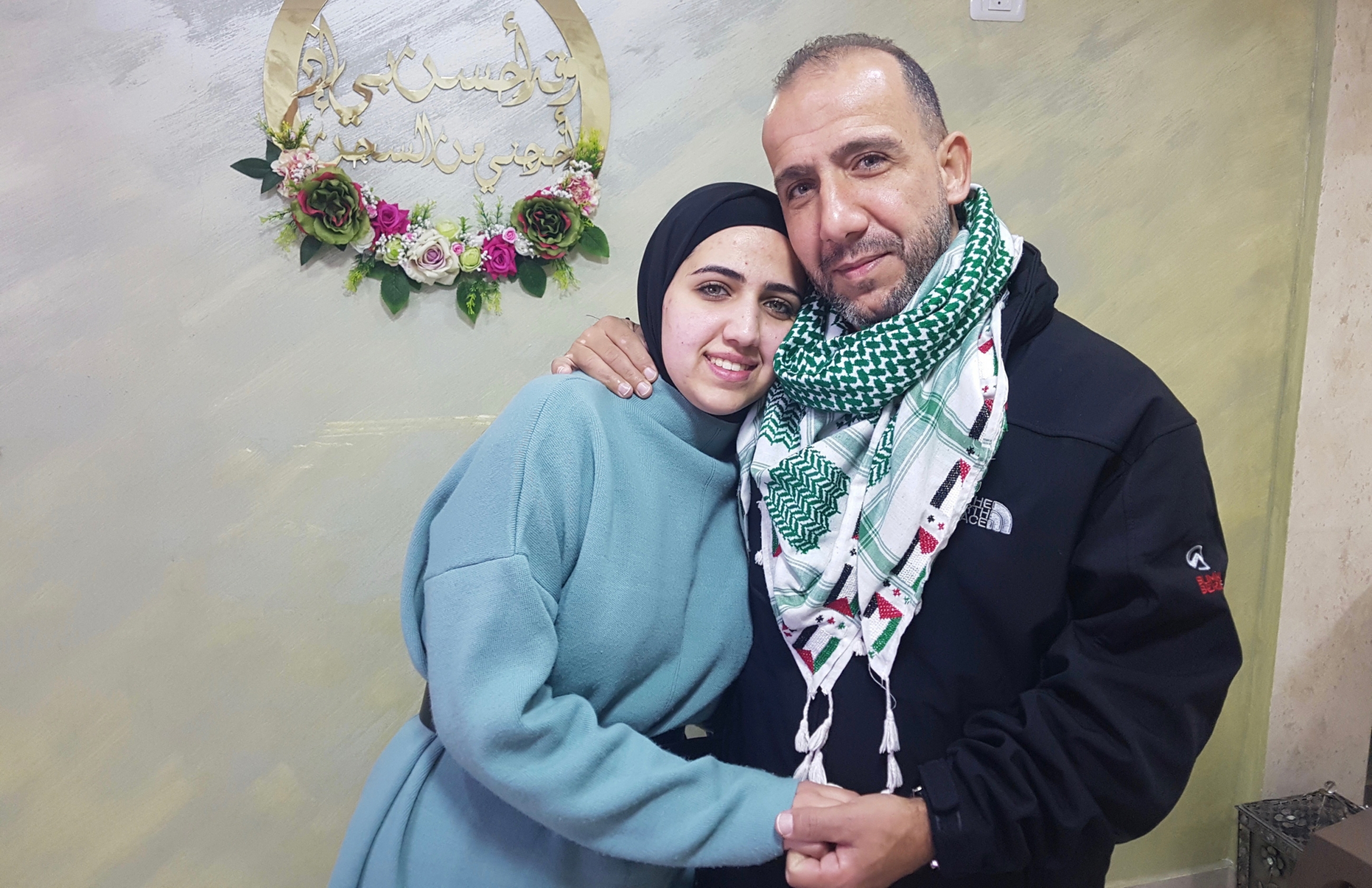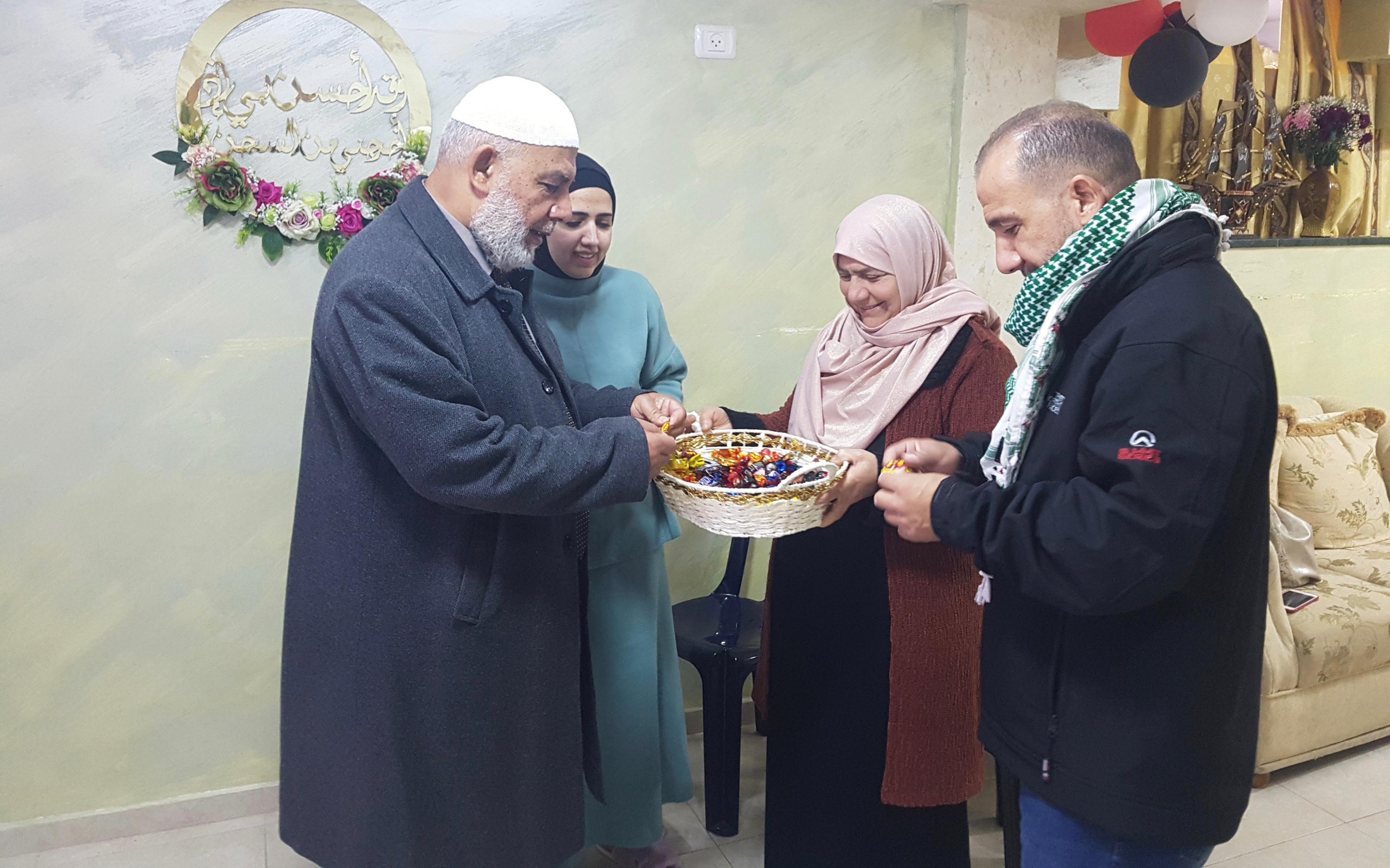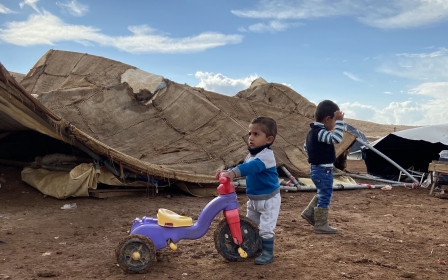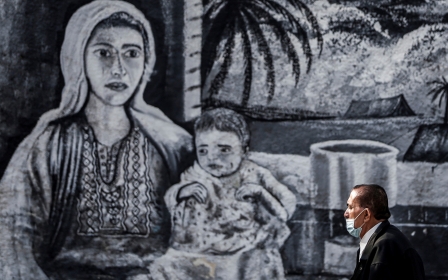After 19 years in detention, Palestinian prisoner learns to live in changed world

After almost two decades in Israeli jails, on the last day of 2020, Malek Bkairat was released from Naqab prison to a world different from the one he remembered back when he was locked up at 22 years of age.
The "blessing of patience from God to the prisoners," he said, was the only thing that enabled him to reintegrate into the outside world since his release, away from the chains of prison, to embrace his only daughter, Lina, and his father, whom Israeli authorities prevented from seeing him for the past five years.
'It is as if I was dead and buried in a grave, and 19 years later, they dug out my grave and told me to come back to life again, after death'
- Malek Bkairat, former prisoner
He said his release has brought him joy but also shock and alienation at the passage of time, the changes that have taken place and the generations that sprouted while he was behind bars.
"It is as if I was dead and buried in a grave, and 19 years later, they dug out my grave and told me to come back to life again, after death," Bkairat told Middle East Eye from his hometown of Sur Baher.
"There are new homes. The town's cemetery is now full. I am like a child who recently learned to walk; still practising how to walk uphill and downhill, because in the prison we only walked in a small yard on flat land."
New MEE newsletter: Jerusalem Dispatch
Sign up to get the latest insights and analysis on Israel-Palestine, alongside Turkey Unpacked and other MEE newsletters
On the last day of 2001 during the Second Intifada, Bkairat was arrested and later charged with forming a cell to carry out operations against Israeli forces in Jerusalem.
He said he believes that the verdicts against him and his friends were excessive, explaining that the judiciary justified the long sentences by citing the security situation, and said that the verdict should act as a deterrent for Palestinians in Jerusalem against planning or carrying out attacks.
"There is no human being on earth who wishes to go to prison, but as long as there is an occupation, there is resistance, and the fate is therefore imprisonment," Bkairat said.
During his time in detention, Israeli prison authorities punished Bkairat by repeatedly transferring him from one prison to another and placing him in solitary confinement, he said.
But despite the hardships, he said he was nicknamed "the father of optimism," and he took part in five mass hunger strikes throughout the years.
Prior to his imprisonment, Bkairat was a paramedic at the Al-Aqsa Mosque compound clinic, where he agreed to volunteer for a symbolic sum.
When he was arrested in 2001, he was unaware that his wife was pregnant with their first baby, who, on all but two occasions during the past 19 years, interacted with him during family visits from behind a thick glass barrier.
When his daughter was four years old, he and his wife separated, and she was taken to live with her paternal grandparents.
Sitting next to her father, Lina observed his features and listened intently as he spoke about his life and his experiences.
Describing the moment of his return home, Lina said it was among the "most beautiful moments of my life that I'll never forget as long as I live".
She added that she felt as though her life had been divided into two parts: before and after her father's release from prison.
"The missing part of my life is now complete."
A family's history of struggle
Bkairat and his family have a long history of being targeted by the Israeli occupation. His father, Najeh Bkairat, a well-known sheikh among Palestinians who holds the position of deputy director of the Islamic Endowments in Jerusalem, has been arrested on many occasions due to his activism surrounding Al-Aqsa Mosque.
Since his son's release, Najeh Bkairat has been taking successive phone calls from family members and friends to congratulate Bkairat and the family on his long-awaited freedom.
"When I saw Malek enter the yard of the house with his head held high and his mother running towards him to embrace him, I could not control myself and burst into tears," the elderly man told MEE.
When Bkairat was released from the Naqab prison, Israeli intelligence forces re-arrested him and transferred him to al-Mascoubiya interrogation centre in Jerusalem, questioned him for three hours, and held him until the next day. His father was also arrested the next day and taken to the same interrogation centre, where the two met.
An hour after they were released, Israeli occupation forces raided their home in Sur Baher and re-arrested Najeh Bkairat.
He told MEE that Israeli intelligence questioned him over the celebration he and his family had organised in the courtyard of their home to receive Bkairat.
"I preferred prison over freedom that night because they want the freed prisoner to be worthless and to close the doors of our homes in the face of well-wishers. I do not accept this," Najeh Bkairat said.
Hours later, he was released on the conditions of a one-week house arrest and a fine of 5,000 shekels ($1,600) for allegedly violating Covid-19 restrictions.
Najeh Bkairat said that Israel's persecution of the family has been continuing for some 40 years. He has been arrested 15 times and has spent a total of seven years in Israeli prisons. He has also received 24 orders temporarily banning him from the Al-Aqsa Mosque and his nearby office, for a total time adding up to nine years.
'I preferred prison over freedom that night because they want the freed prisoner to be worthless and to close the doors of our homes in the face of well-wishers'
- Najeh Bkairat, Malek's father
"The occupation authorities do not like how I expose their policies towards Al-Aqsa, so they target me and all my children because we love Jerusalem and Al-Aqsa and defend them," he said.
In 1997, Malek Bkairat was arrested and detained for five months under administrative detention, a controversial policy Israel uses to incarcerate Palestinians without trial or charge.
Back at home, Bkairat's smile never left his face.
He said his only wish is to visit Al-Aqsa Mosque, which is now closed due to Covid-19 measures.
"I am impatiently waiting to enter it and to perform the call to prayer there. I was [also] known by the title 'muezzin of the prisoners' as I used to conduct the call to prayer in all the prisons I was in," Bkairat said.
Middle East Eye delivers independent and unrivalled coverage and analysis of the Middle East, North Africa and beyond. To learn more about republishing this content and the associated fees, please fill out this form. More about MEE can be found here.






